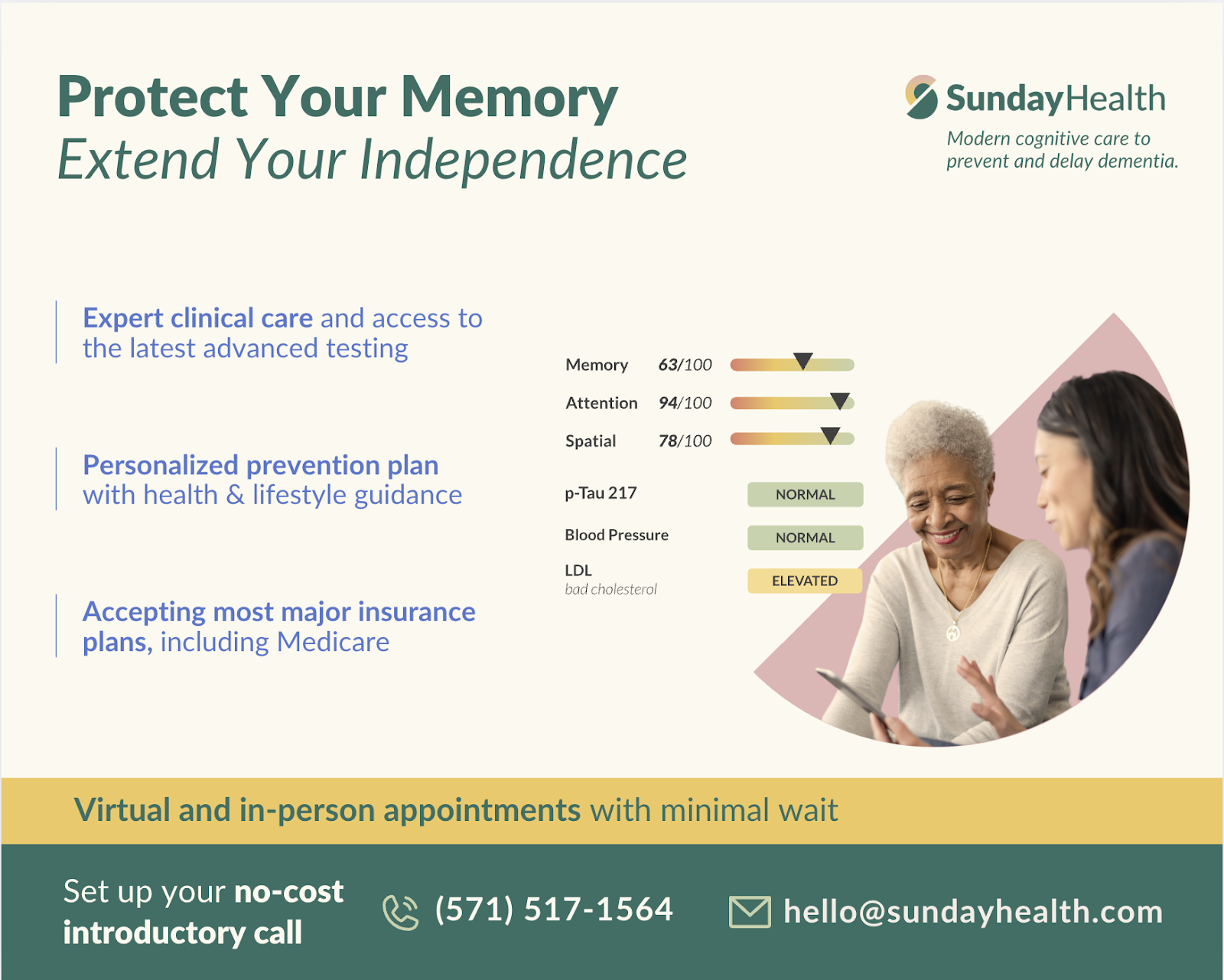Debunking Common Myths: "It's Too Late (or Too Early) to Focus on Brain Health"

Debunking Common Myths: "It's Too Late (or Too Early) to Focus on Brain Health"
Misconceptions about cognitive health – our memory and thinking abilities – and aging are widespread and often prevent people from seeking the care they need. In this four-part series, the brain health experts at Sunday Health will debunk common myths that might be standing between you and optimal cognitive wellness.
Many adults believe they are either too young or too old to worry about cognitive decline. The reality is: brain health is a lifelong concern, and efforts to protect it can be beneficial at any age.
The Myth of "Too Young to Worry"
Younger adults often think brain health is something to address only later in life. However, studies show that Alzheimer's disease begins decades before symptoms appear. In fact, changes in the brain may start as early as age 40. This silent progression means that waiting until retirement age or later to address brain health could mean missing valuable opportunities for intervention.
The foundations of a healthy brain are built throughout life. Habits established in early adulthood, like regular exercise, healthy eating patterns, quality sleep, and stress management, create cognitive resilience that can protect against decline later.
The brain you have at 70 reflects how you've treated it for decades, meaning midlife is not only an appropriate time to act—it may be the most critical window for prevention.
The Myth of "Too Late to Benefit"
At the same time, older adults may feel that it's "too late" to do anything about cognitive decline. This belief can lead to feelings of helplessness and passivity. However, research consistently shows that the brain remains remarkably adaptable well into old age.
A landmark study from the Rush Memory and Aging Project followed adults over 80 and found that those who maintained active lifestyles experienced significantly slower rates of cognitive decline. Even those who began new activities in their 70s and 80s showed measurable benefits compared to those who remained sedentary.
Other interventions, such as managing chronic diseases like diabetes and hypertension, addressing hearing loss, improving sleep quality, and maintaining social engagement, can still significantly slow progression or improve quality of life, regardless of age.
Advances in Early Detection
In recent years, new diagnostic tools have made it easier to detect signs of disease early. Blood tests measuring biomarkers such as p-Tau217 can identify individuals at risk long before symptoms begin. Advanced brain imaging can detect changes in brain structure and function years before memory problems emerge. These technologies give people the opportunity to take informed action while they're still healthy and active.
The Value of Establishing a Cognitive Baseline
Most of us are familiar with screening tests like colonoscopies, mammograms, prostate exams, pap smears, and bone density scans. But there’s a notable and important omission from that list: any screening for the health of your brain and cognitive function, especially as you age. Working with a cognitive care specialist to establish a brain health baseline will allow your cognitive performance in later years to be compared to your earlier ability.
While everyone could indeed benefit from a brain health baseline, establishing that baseline becomes even more important for anyone who:
- has reached middle age or later
- has a family history of Alzheimer's disease or another dementia
- has a personal history of a head injury, stroke, or other neurological condition
It's never too early—or too late—to start thinking about your brain. And there's no one-size-fits-all approach. What matters most is finding a plan that works for you and sticking with it. Whether you're 45 or 85, the best time to focus on brain health is now.
How Sunday Health Can Help
Sunday Health is a modern cognitive care clinic dedicated to helping individuals take a proactive approach to brain health. Our compassionate team—including cognitive neurologists, nurse practitioners, and care navigators—provides expert clinical care alongside evidence-based programs tailored for older adults to help prevent and delay cognitive decline.

We serve patients in Washington, DC, Maryland, and Virginia via convenient telehealth appointments and in-person at our office in Vienna, VA. We accept Medicare, Medicare Advantage, and most commercial insurance plans, and no referral is needed to schedule an appointment.
If you or someone you love has concerns about memory or dementia, we're here to help with compassionate, state-of-the-art care. Taking action early can make all the difference in maintaining the active, engaged lifestyle you deserve.




